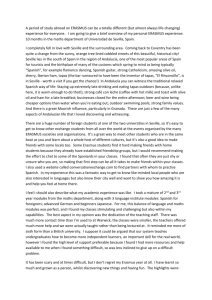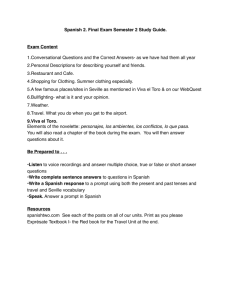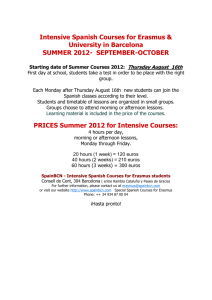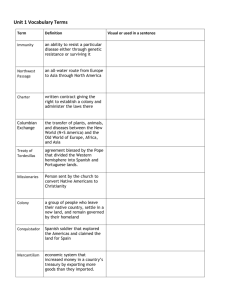Emily Vosper 2012-13 - University of Warwick
advertisement
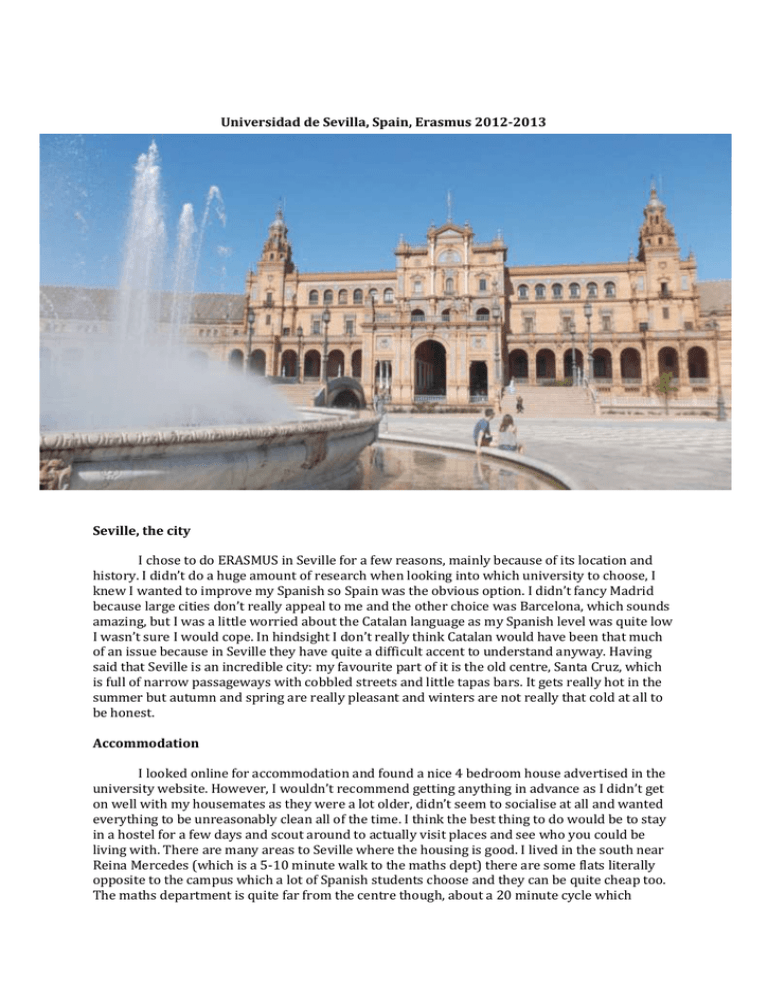
Universidad de Sevilla, Spain, Erasmus 2012-2013 Seville, the city I chose to do ERASMUS in Seville for a few reasons, mainly because of its location and history. I didn’t do a huge amount of research when looking into which university to choose, I knew I wanted to improve my Spanish so Spain was the obvious option. I didn’t fancy Madrid because large cities don’t really appeal to me and the other choice was Barcelona, which sounds amazing, but I was a little worried about the Catalan language as my Spanish level was quite low I wasn’t sure I would cope. In hindsight I don’t really think Catalan would have been that much of an issue because in Seville they have quite a difficult accent to understand anyway. Having said that Seville is an incredible city: my favourite part of it is the old centre, Santa Cruz, which is full of narrow passageways with cobbled streets and little tapas bars. It gets really hot in the summer but autumn and spring are really pleasant and winters are not really that cold at all to be honest. Accommodation I looked online for accommodation and found a nice 4 bedroom house advertised in the university website. However, I wouldn’t recommend getting anything in advance as I didn’t get on well with my housemates as they were a lot older, didn’t seem to socialise at all and wanted everything to be unreasonably clean all of the time. I think the best thing to do would be to stay in a hostel for a few days and scout around to actually visit places and see who you could be living with. There are many areas to Seville where the housing is good. I lived in the south near Reina Mercedes (which is a 5-10 minute walk to the maths dept) there are some flats literally opposite to the campus which a lot of Spanish students choose and they can be quite cheap too. The maths department is quite far from the centre though, about a 20 minute cycle which doesn’t sound too bad, but if you’re more into going out I would recommend staying in the centre, again there are some nice flats in the Santa Cruz area which a lot of Erasmus students tend to choose. Money Getting a Spanish bank account would be a good idea. I chose to go with “La Caixa” as they allow you to apply as a temporary resident and you don’t have to get things signed to prove you’re staying in Spain. You get a free account until you’re 26. All you have to do is go in and talk to someone and they should set it up that day and you get your card a couple weeks later. You do need to have a Spanish address first and it helps to have a Spanish phone number too. Once you’ve got your account a good site to use to transfer money from your English account is “TransferWise” they do a really good exchange rate. Another thing to remember is that if you take out money at an ATM of a different Spanish bank to your own, you get charged, sometimes it can be up to 4 Euros. Getting a phone It really depends what you want from your phone, whether you want to just text or use the internet too. There are loads of places you can get PAYG sim cards like yoigo and movistar. I got mine from Vodafone (it’s not the same as the English company, neither is the Spanish version of orange which is annoying) I got a sim that gave me 100 free texts and 100mb of internet a month upon topping up 10 Euros which wasn’t bad. Their website was a bit annoying though so I always had to top up at an ATM. One thing to bear in mind is that the univeristy do have wifi to connect to, the only thing is you have to have an account with eduram which I never managed to find out how to do. Perhaps it might be easier to set an account up at Warwick before you go, although I’m not sure if that’s possible. Making friends Before I started at the university I did a few weeks as an aupair nearby, so I met a few Spanish people before hand which was good. Once I got to university, however, it was really hard to integrate with the Spanish people in my classes and the university doesn’t seem to have many clubs or societies to join at all so it didn’t give that many opportunities to make friends. The Erasmus society hosts many parties at the start of term which is a great opportunity to meet people from all over Europe, it’s where I met some of my closest friends on my year abroad. I would definitely recommend going even if you’re more focused on being friends with the locals to improve your Spanish, it’s nice to talk to people who are in the same boat as you. Food and drink The food in Seville is great, there’s loads of great tapas bars to go to, and some can be really cheap, like 2-3euros for one plate of tapas (which can be quite a good portion) There’s a place called Levies in santa cruz (calle Levies) which does really good cheap tapas, the service can be a bit bad but it’s a really cool place. Supermarkets are quite small in Seville and don’t really offer a great deal of choice, you can still get food, but it might be worth getting a few Spanish recipies together because western style food is a lot more expensive. Transport Seville has a regular bus service within the city, you pay a set price to get on the bus which is around 1-2 Euros, they changed the price quite a bit while I was there and you can’t get return tickets, they also have aircon which is great during the summer. The website for the company is here http://www.tussam.es/, although I always found Spanish websites quite difficult to navigate. A great way to get round the city, other than by bus, is using the bikes they provide. You pay around 30 Euros for the year and this allows you free access of the bicycles they have dotted around the city for up to half an hour. After this amount of time is up you have to pay, but everyone swaps bikes after 30 minutes and continues their journey. The system is very much like what they have in parts of London, and information about how to sign up for it can be found here: http://en.sevici.es/ you can sign up online which is what I did, or go to the office in person. The University The academic year consists of two semesters, the first starts in September and ends in February, included in this is about 3 weeks of exams and study leave, and two weeks off for Christmas. As soon as exams finish you go into the second semester which lasts until July and includes two separate weeks off for Spanish festivals. The University of Seville is split up into several different campuses, Maths is in the Reina Mercedes campus in the south, about a 20 minute cycle ride from the centre. There is also a gym which is situated in Los Bermejales, which is a good 15 minute walk south of the maths department, the gym is pretty good facilities wise, but getting signed up is a bit of a mission. If it’s the same as when I was there you’ll find yourself having to sign a few forms with the international office on arrival, as well as this you have to get yourself “online” which means going to the biology department (for some reason) and talking to the online sign up people and then a few days later you should be on their system. After this you can sign up to the gym, you’ll need your passport, a passport photo and evidence that you’re an Erasmus student at the university. It took me about a month overall to get signed up because I just didn’t know what to do and no-one else really did either. You can find the membership fees and other information on their website http://www.sadus.us.es/ Maths and other modules One thing about the maths modules which I found interesting is that each one has up to three classes, each class has a different teacher and each teacher will set a different exam. In the exams some will let you bring in text books and even phones, and others will be really strict, this was quite a shock for me to be honest but you do get used to how relaxed it can be. The exams are marked out of 10 and a pass is 5/10. There are regular class tests for each module, second year modules tend to have two class tests over the course of the term and third year ones tend to have three, they count for credit but in a slightly bizarre way. If you pass all class tests then you don’t tend to have to do the final exam and your mark is an average of the class tests, sometimes you don’t have to even pass all of them if you do exceptionally well in the majority, it really depends on what the teacher is like and in some cases how much they like you. If you fail a class test, then your mark depends solely on your final exam grade, so it makes sense to try and pass every class test although depending on which modules you take and how many, this can be quite difficult, I didn’t know anything about this before I arrived so I ended up with class tests every 1-2 weeks. The modules themselves are weighted using ECTS, where 1ECT is worth 2CATS, each maths module is worth 6ECTS. I chose to do 3 second year modules and 3 third year modules, three per term which was okay, but I would have preferred more in the first term and less in the second. The modules I took were: Geometria local de curvas y superficies (3rd year) – a nice module to take, I found it really interesting but the class I was in supplied no lecture notes, no past papers and no solutions to work sheets. I found it quite hard to read the lecturers handwriting so ultimately fell behind quite fast and found it difficult to catch up. It was a very interesting module though and really helps for third year if you’re interested in doing geometry of curves and surfaces. Funciones de una variable compleja (3rd year) – Again another useful module to take that helps you in third year, there were great lecture notes in most classes and some past papers Lebesgue integrals (2nd year) – I loved this class and had a great lecturer who was happy to help explain things in English when I really didn’t know what was going on, again good lecture notes and past exams. Analysis functional (3rd year) – there is only one class for this which suggested it would be quite difficult and it really was, started off okay and then the class tests got a lot harder. Fisica 2 (2nd year) – I actually intended to do a different module with this one but there was a room typo on the timetable and I ended up really enjoying the first lecture. It helps if you’ve done a bit of physics before hand, but as a module it’s quite interesting. The only thing is, even though it’s a maths module, it’s taught by a physics lecturer and the physics department in Seville is notorious for being extremely difficult, so not a lot of the people in the class actually passed. Integrales de funciones de varios variables (2nd year) – this is a great module to do, it’s similar to lectures taught in first and second year at Warwick and it’s great learning it from a Spanish perspective, there are things we did cover that I’d never seen before. (If I remember rightly there are similar things covered in geometry and motion) I wish I had done DFVV which is the equivalent but with differentiation and taught in first term. Other modules I also took the Spanish for foreigners module which was useful, you have to do a test before hand to sort you into the best class. The teachers talk only in Spanish which is great. They didn’t give much feedback at all which is the only thing I found frustrating as I never got much of a chance to write in Spanish due to doing a maths degree so didn’t really improve in that respect. I also took a French module which was fantastic, it was a great way to meet Spanish people and the teacher was really good, there are other languages available too, I would recommend doing an additional one if you can, it was a lot of fun. Something I only found out about at the end of term is that the Gym can award credits for certain things, one thing I tried to do at the end but just didn’t have enough time to complete was the “programa de adherencia” where you have to run, swim, cycle etc a certain amount of kilometres to achieve either a bronze, silver or gold medal which is awarded at the end of the year. If you achieve a medal then you get awarded either 1 or 3ECTS, I’m not sure which one, again different people tell you different things. To arrange this the first thing you have to do is talk to the gym instructors to sign up and hopefully they can tell you about gaining credits, but when I was there they didn’t really know so I had to talk to a few people before I got an answer and by that point there wasn’t enough time to actually achieve a medal. So if you’re interested in doing this, try and get it organised in the first semester. Travelling outside of Seville Part of the beauty of Erasmus is that you get a chance to visit some of the country to really get a feel for the culture. I would suggest travelling by bus from Seville as it is cheaper, but train is a lot faster. There are different bus companies that leave from Seville and go to different places. This is one of them http://www.alsa.es/en/ and one that goes straight to Madrid is http://www.socibus.es/html/index.php, I used both of these and they were fine. I would say to book in advance for some weekends, especially the holiday weekends as the tickets go quite fast. The Erasmus society also do a few trips which are great for meeting people and seeing places, but after a while they get a bit tiresome as you can’t really do your own stuff. Flights from Seville to Marrakesh and the canaries or other part of Spain are also very cheap, especially with Ryanair. Summary Looking back, Erasmus wasn’t as easy as I thought it would be, I didn’t expect it to be a walk in the park, but I didn’t expect it to be as stressful as it was. Having said that it was a great year, even with the downs, there were a lot of ups: I have made many friends and experienced a different culture. I think a lot of people tend to “big up” Erasmus to make it sound like the best year of your life, and I’m sure to a lot of people it is, but at the same time I think if someone had actually said to me “look, it’s going to be difficult sometimes, this is what you need to think about...” then I would have gone there a lot more prepared and probably have enjoyed it a lot more. I still would recommend doing it, especially if you have a good level of Spanish as that just makes things a lot easier and simpler. It is a great opportunity and is brilliant to put on your CV, you learn a huge amount about Europe from the other students and get a taste of what it’s like to live abroad for almost a year, which really helps you get a bit more perspective on the world and look at the UK from a different view.
